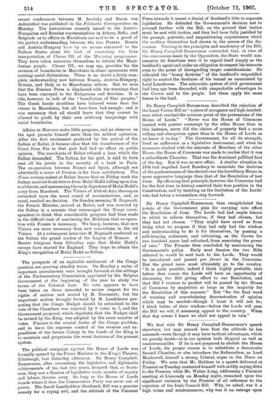Sir Henry Campbell-Bannerman described the rejection of the Land Values
Bill as " a piece of arrogance and high-handed- ness which reached the extreme point of the pretensions of the House of Lords." "Never was the House of Commons treated with greater contempt by the other House than in this instance, never did the claims of property find a more willing and obsequious agent than in the House of Lords as we know it to-day." The Government, for all its strength, lived on sufferance as a legislative instrument, and when its measures clashed with the interests of Members of the other House, the House of Commons was made to realise that it was a subordinate Chamber. That was the dominant political fact of the day. But it was no new affair. A similar situation in 1894 had impelled Lord Rosebery to enunciate the doctrine of the predominance of the elected over the hereditary House in more aggressive language than that of the Resolution of last June. By affirming that principle, however, the Commons had for the first time in history asserted their true position in the Constitution, and by insisting on the limitation of the Lords' veto had taken a tremendous step forward.










































 Previous page
Previous page